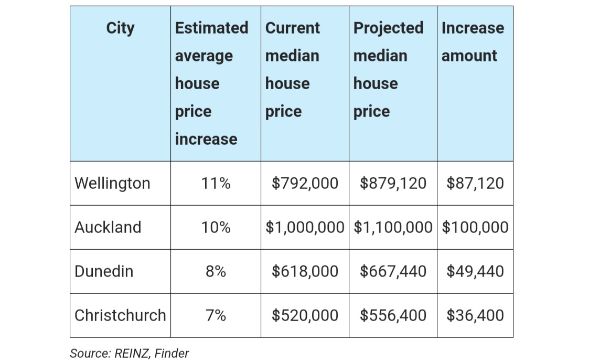Finder RBNZ Survey: 69% Of Experts Support Stricter LVR Requirements For Investors
News highlights:
- Majority of experts say 40% deposit rule is adequate for investors
- Property prices expected to jump by 11% in Wellington, 10% in Auckland in 2021
- All experts and economists surveyed expect the OCR to hold at 0.25% in February
Experts and economists are in favour of stricter loan-to-value ratio (LVR) requirements for property investors, with the Reserve Bank set to crack down on investor lending from 1 May.
In this month’s Finder RBNZ Official Cash Rate Survey, 13 experts and economists weighed in on future official cash rate (OCR) moves and other issues relating to the state of New Zealand’s economy.
The majority of experts (69%, 9) agree with the Reserve Bank’s ruling that at least 95% of new bank lending to residential property investors will need to go to borrowers with deposits of 40% or more (up from the 30% requirement that will be reintroduced in March).
Despite this, nearly a quarter (23%, 3) believe this deposit requirement is too high.
Kevin McHugh, Finder’s publisher in New Zealand, said that removing LVR restrictions has created a new set of financial risks for property investors.
“LVR restrictions were eased during the pandemic to prevent their interference with policy responses around fiscal stimulus and consumer confidence.
“But New Zealand’s housing market has since rapidly accelerated, even hitting a new national median price record of $769,000* this month.
“Without LVR requirements, many property owners – particularly investors – are now at risk of being overleveraged, and are vulnerable to house price corrections.
“Increasing the LVR requirements to 40% should hopefully prevent this situation from escalating any further,” McHugh said.
Kelvin Davidson, senior property economist at CoreLogic, is optimistic about the impact of increasing LVR requirements based on past success.
“In 2016 when LVR deposit requirements last went to 40%, it was enough to reduce the financial stability risks that had been emerging.
“We saw investors' share of the market ease down, along with house price growth – I'd expect something similar this time,” Davidson said.
Expected house prices increases for 2021
REINZ data for January revealed that the national median house price jumped by a seasonally adjusted 2% from the month before, rising from $612,000 on 31 January 2020 to $730,300 on 31 January 2021. This is an increase of 19% and the biggest annual rise since 2004.
Experts are predicting that house prices will continue their upward climb throughout 2021, with Wellington expected to see the biggest spike.
Here, experts are forecasting house prices to rise by 11% on average during 2021, which would see the median Wellington home rise by $87,120 from $792,000 to $879,120.
Experts also predict median house prices to increase by 10% in Auckland, 8% in Dunedin and 7% in Christchurch on average during this time.

Official cash rate expected to hold this February
All experts surveyed (13/13) believe the OCR will hold at 0.25% this month, with the vast majority (84%) expecting the OCR to remain stagnant throughout 2021.
Despite this, 8% (1/13) expect the OCR to increase in November, while almost a third (30%, 4) predict a rise in 2022.
According to Dr Oliver Hartwich of The New Zealand Initiative, the next OCR move is likely to be an increase, but the unpredictability of COVID-19 makes it hard to determine when this will be.
“The resilience of the New Zealand economy and especially the labour market has surprised everyone.
“If that trend continues, the next step in the cash rate could well be an increase. However, it is too early to tell whether the trend will hold,” Dr Hartwich said.
McHugh said that it’s unlikely that the RBNZ will make any big moves in relation to the OCR for now.
“Low interest rates have been successful and the housing market hasn’t missed a beat. While housing affordability remains a big issue, the economy is stabilising.
“We’ll have to wait and see what the rest of the year has in store,” McHugh said.
*According to Trade Me Property latest index, as of Feb 2021
Here’s what our experts had to say:
Bindi Norwell, REINZ: The OCR will have to lift at some stage but given the unpredictability of COVID outbreaks, it would be hard to predict when this will happen. With regards to house price pressure, I expect the RBNZ will wait and see how the reintroduction of LVRs will affect the market before being tempted to use OCR as a tool to influence that market.
Debbie Roberts, Property Apprentice: With recent significant changes to the LVR restrictions, and (with the exception of any impact from the current COVID restrictions) the ongoing stability in the economy, I can't see the need for the RBNZ to make a change to the OCR at this stage. I do believe that we are unlikely to see a further reduction in the OCR, so the next change is likely to be an increase, but probably not within the next 6-12 months at this stage. Having said that, we have all seen how quickly things can change.
Alfred Guender, University of Canterbury: In uncertain times central banks tread carefully. Given the current state of the economy and elevated asset prices in New Zealand, a change in the OCR would be surprising.
Kelvin Davidson, CoreLogic: I'm hopeful that the vaccine will work and borders will be open by then, stimulating the economy – this may be more ambition than realism though.
Ashley Church, ashleychurch.com: While the Reserve Bank is unlikely to have any appetite for further rate reductions in light of stronger expected growth – it is also unlikely to want to upset that recovery with any increase in rates at this time. Instead it will take a “wait and see” approach.
Brad Olsen, Infometrics: The Reserve Bank will need to leave interest rates low for an extended period to boost inflation above the 2% mid-point and bring employment higher – we're on the right path but there's a lot of distance to be covered. Although economic indicators have been upbeat recently, there's still need for sustained levels of support to the economy. Equally, however, we can't see the need for even more accommodative monetary policy going forward unless circumstances change.
Robin Clements, UBS NZ Ltd: Once it is clear that inflation is/or will be near the target mid-point.
Leonie Freeman, Property Council New Zealand: We need to get the economy positive in a period of uncertainty so don't anticipate any increase, but don't expect it to go lower.
Dr Oliver Hartwich, The New Zealand Initiative: The resilience of the New Zealand economy and especially the labour market has surprised everyone. If that trend continues, the next step in the cash rate could well be an increase. However, it is too early to tell whether the trend will hold. I would not expect any such move in the near future for that reason, but at the very least I don't see good reasons for further monetary easing.
Donal Curtin, Economics New Zealand Ltd: Economic recovery better and faster than expected, potentially inflation may also be on the rise, either way no call for further ease and case will build in time for normalisation.
Sharon Zollner, ANZ Bank: There are still significant downside risks to the economic outlook and so the RBNZ will take a very cautious approach to lifting the OCR.
Michael Reddell, Croaking Cassandra: There is no serious prospect of an OCR increase this year, with inflation still below target and unemployment well above a NAIRU. Beyond that, forecasting isn't really possible (shocks dominate). There is still a reasonable case for an OCR cut this year, reinforced by a weak world economy and fading fiscal stimulus.
Jarrod Kerr, Kiwibank: Hopefully the world is in a better place next year, with vaccinations taking centre stage. The Kiwi economy still lacks foreign tourists and students, but a vaccine passport should change that. We're forecasting solid growth and a gradual return to the RBNZ's mandated targets.


 Brewers Association: Brewers Association Of New Zealand Supports Modernisation Of Alcohol Legislation
Brewers Association: Brewers Association Of New Zealand Supports Modernisation Of Alcohol Legislation Commerce Commission: ComCom Warns Of Pyramid Schemes After South Auckland Scammers Plead Guilty
Commerce Commission: ComCom Warns Of Pyramid Schemes After South Auckland Scammers Plead Guilty MBIE: MBIE Publish Mid-Point Review Of The Phase-Out Of The Low Fixed Charge (LFC)
MBIE: MBIE Publish Mid-Point Review Of The Phase-Out Of The Low Fixed Charge (LFC) Science Media Centre: Company Claims To Have “De-Extincted” The Dire Wolf – Expert Reaction
Science Media Centre: Company Claims To Have “De-Extincted” The Dire Wolf – Expert Reaction Stats NZ: Greenhouse Gas Emissions Fall 2.0 Percent In The December 2024 Quarter
Stats NZ: Greenhouse Gas Emissions Fall 2.0 Percent In The December 2024 Quarter The Reserve Bank of New Zealand: Christian Hawkesby Appointed As Governor Of The RBNZ
The Reserve Bank of New Zealand: Christian Hawkesby Appointed As Governor Of The RBNZ



